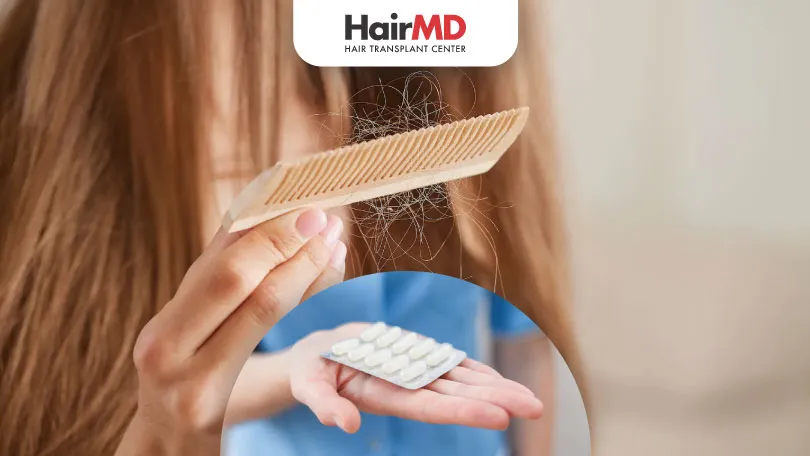12th September, 2021

Like any other part of the body, hair equally needs vitamins and other nutrients such as – Vitamin B, Vitamin C, Vitamin D, Vitamin E, Zinc, Iron, and proteins to keep hair healthy and strong.
Hair fall is a major issue today faced by many of us. As you know, hair fall can be caused due to several reasons – it can be hereditary or can be caused due to medications, stress, etc.
This guide will be useful if you’re curious to know how antibiotics cause hair loss.
What’s covered in the article?
- Do Antibiotics Cause Hair Loss?
- How Much is Too Much?
- How to Deal with Hair Loss Caused by Antibiotics?
- Conclusion
Do Antibiotics Cause Hair Loss?
Antibiotics are used to treat both common and life-threatening infectious diseases around the world. While their importance in extending the life and improving health cannot be overstated, they do have some drawbacks for some people. Hair loss is one such common side effect of some antibiotics.
Antibiotics can reduce vitamin B and haemoglobin levels. Haemoglobin is responsible for transporting oxygen to our bodies’ cells for growth and repair, promoting hair growth. Antibiotics can cause inadequacies in vitamin B and haemoglobin, which is proven to cause hair loss.
Antibiotics come in various forms, but the most common antibiotics that can cause hair loss are penicillin, erythromycin, and cephalexin.
How Much is Too Much?
Your doctor is the best to decide the dosage. It is advisable not to alter the dosage on your own. If you are taking antibiotics for some chronic disease, you should not discontinue the intake. You can always contact your doctor to discuss your hair loss problem. They can alter the dosage as per your need and requirement.
How to Deal with Hair Loss Caused by Antibiotics?
You might be relieved by knowing that the hair loss caused by antibiotics is not permanent. This type of hair loss is usually followed by the regrowth of new hair in a span of around 6 months. While the hair may appear thinner than usual, this is only a temporary issue, and fullness will eventually return.
Suppose you’re unhappy with your thinner hair ringlets; there are several useful ways to remedy this condition, including taking nutritional supplements that stimulate hair growth, such as Biotin, Omega-3 Fatty Acids, and Vitamin B12.
The diet also plays a key role in hair health. Add more iron to your meal for extra thickness, and fill your plate with leafy greens and broccoli. Furthermore, protein-rich foods such as eggs, meats, and fish are essential for hair growth.
Alternatively, you can go for various hair treatment procedures as suggested by your doctor.
HairMD has a wide range of hair treatment procedures – from hair transplants to everything you need to get your beautiful hair back.
Do You Know?
Nearly 250 Patients Visit HairMD
Everyday For Various Hair Concerns?
(Your journey to healthier and fuller hair starts here!)
Meet Our Dermatologists
Conclusion
Antibiotics do not cause hair loss in everyone, but it is critical to consult your doctor as soon as possible if you are facing excessive hair loss. If taking antibiotics is the reason for your hair loss, your physician can determine whether to change or stop the antibiotics. Your doctor knows better. Hence changing the dosage all by yourself might not be a good idea.
Book your consultation with a dermatologist at HairMD. Our expert dermatologist will provide you the personalised treatment for your hair problem.
Further Reading
Top Kitchen Ingredients to Boost Hair Growth
Discover the best kitchen ingredients for hair growth! Use coconut oil, onion juice, aloe vera & more to nourish your hair naturally and reduce hair fall.
How to use Minoxidil and Dermaroller together?
Boost hair growth with Minoxidil & Dermaroller! Learn the right technique, benefits, and mistakes to avoid for thicker, healthier hair.
Powerful Home Remedies for Itchy Scalp
Soothe an itchy scalp naturally with home remedies like aloe vera, coconut oil, and apple cider vinegar. Discover simple solutions for scalp relief.
Omega-3 for Hair Growth: Benefits and Side Effects
Omega-3 nourishes hair, promotes growth, and reduces hair fall. Know its benefits, side effects, and best sources for healthy, stronger hair.
Have thoughts? Please let us know
We are committed not only to treating you, but also educating you.











